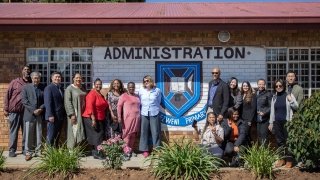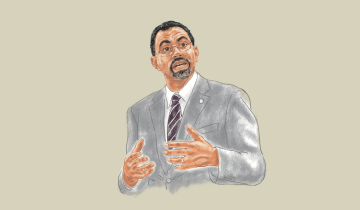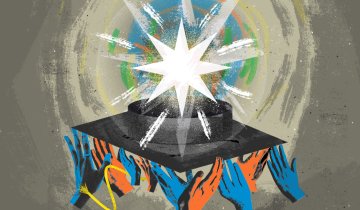For Shuai Fu EdD ’24, an art teacher from China and graduate of USC Rossier’s Global Executive Doctor of Education program, the most memorable part of his recent trip to South Africa was a visit to Dumezweni Elementary School in Soweto, a township southwest of Johannesburg. Fu, who goes by the first name of Frank in the U.S., says that teachers and students from the school welcomed him and the other Global EdD students and faculty with “a ceremony that began with singing and dancing.”
While Fu hasn’t received formal training in music, he was moved by the impressive display and could see “South Africa’s education attached great importance to the cultivation and dissemination of traditional culture.” It was evident that these traditions permeate the nation in the way that their tour guide “who had never been to this elementary school, was able to immediately immerse himself in the music and dancing,” Fu says. The experience “left a deep impression on me as an art teacher from the other side of the world,” he says.
USC Rossier’s Global Executive Doctor of Education program attracts a range of students from a variety of backgrounds, from art teachers like Fu and nonprofit leaders to government workers and policymakers. One thing all Global EdD students have in common is that they are curious to learn more about international education practices.
The program, which takes place over the course of nine terms, is designed for senior educational professors aiming to improve educational outcomes on a larger scale. In addition to online sessions and self-paced assignments, the program takes the cohort on a series of trips to compare and contrast educational systems around the globe. Since the launch of the program in 2012, the program has included stops in Asia, Europe, South America and Africa.
South Africa has been a part of the program’s itinerary since 2022 after Sabrina Chong, director of the Global EdD program, completed a scouting trip to the country.
Professor of Clinical Education Alan Green was equally enthusiastic about adding South Africa to the program’s itinerary. Green describes South Africa as a “fascinating place,” with a “multi-ethnic culture.” The history of the nation’s struggle and eventual dismantling of apartheid in the early 1990s resulted in an “effort to create a more diverse and inclusive society with its constitution that is only 30 years old,” Green explains. While South Africa still struggles with poverty and the legacy of racism, the nation fights to keep its democracy vibrant and offers something we can all learn from, Green says. The trip to South Africa is a “unique opportunity for our students and for the South Africans that we interact with. Both can benefit and grow from the exchange,” Green says.
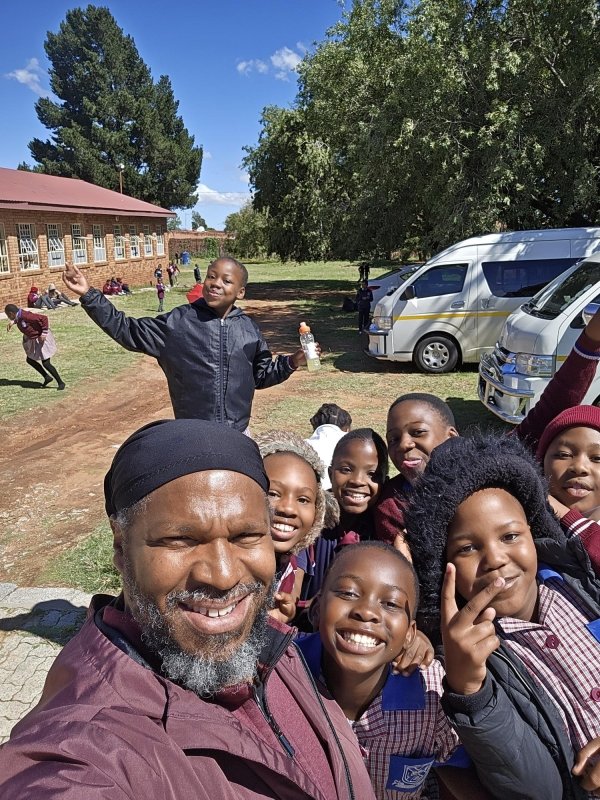
When looking for destinations for the cohort to visit, Chong taps into USC Rossier’s deep pool of contacts and global resources. In the spring of 2024, accompanied by Chong and Green, the cohort visited a number of educational sites in South Africa including the Apartheid Museum, Dumezweni Elementary School in Soweto, the University of Johannesburg and TuksSport Campus.
Student experiences
The range of students who attended the South Africa trip in the spring of 2024 was wide and made for rich dialogue about all that they saw and experienced. Eleven students from the cohort were able to make the six-day long trip. It was a busy time for the students. Many were either in the midst of or wrapping up their dissertation work.
Shuai Fu EdD ’24 has taught fine art, conceptual and contemporary art as well as sculpture, in his native China to people of all ages—from university students to preschoolers. His experiences in South Africa—particularly the trips to the underfunded schools on the outskirts of Johannesburg—made him reflect on his work in China.
“I visited schools in impoverished ethnic-minority areas along the border between Myanmar and China and interviewed students and teachers there. The conditions are not ideal, without beautiful modern school buildings, high-tech teaching aids and digital equipment. We all have our own struggles and are facing different not just economic and hardware infrastructure issues, as well as historical and cultural impacts, and issues from the society and political systems,” Fu says.
However, despite these challenges and differences, a commonality he has witnessed during his travels to South Africa and other nations through the Global EdD program, is the commitment of the educators to their vocation. It reminds Fu of a popular phrase in China, “power generated through love.”
“Educators do generate power from love a lot of times. In Chinese culture, teachers are often compared to candles ‘burning themselves and illuminating others.’ We all know that our energy is not eternal. I also hear from time to time that some peer educators complain to me that their salary was not up to expectations, and they feel tired in the face of endless problems from the students and ‘harassment’ from parents. Understanding the education issues in other parts of the world, understanding their difficulties and learning about their strategies is a great opportunity to provide nourishment for ourselves,” Fu says.
For Cymone Davis EdD ’24, the trip to South Africa “felt like coming home.”
“As a Black woman from Kansas City, Missouri, traveling to South Africa was an emotional and spiritual experience,” Davis says. Everywhere she went, people greeted her with open arms, saying, “Welcome home.” The experience moved her deeply.
Davis’ path to the Global EdD program, oddly enough, “started at a wedding,” she says. She met Dean Noguera at the event and after hearing about her work, he encouraged her to check out USC Rossier’s doctoral programs. “Initially, I wasn’t interested,” she says. Davis already had two master’s degrees and thought she was finished with school. She was also “critical of academia’s disconnect from reality,” but after researching the Global EdD program, its focus on policy and international perspectives resonated with her, and thought she could gain valuable insights to reach her professional goals.
Davis, the former town manager of Tullahassee Township, a historic all-Black town in Oklahoma, launched her own organization, Black Towns Municipal Management in 2021 with a mission to “assist the remaining U.S. Black townships in the areas of community redevelopment and government infrastructure.” Davis also has a goal to launch a Black boarding school in Tullahassee, Kingdom Come International, to provide Black youth with “safe, empowering spaces where Black children can thrive academically,” Davis says.
Black boarding schools, Davis explains, used to be abundant prior to Brown v. Board of Education, and in fact, some of the most well-known Black intellectuals, like Zora Neale Hurston, spent some time at Black boarding schools in all-Black townships, Davis says.
These efforts have been the focus of her dissertation. Through her travels in the Global EdD program, Davis has been exposed to a range of global perspectives and approaches to education that have aided her as she works to establish the new boarding school. The cohort’s visit to the African Leadership Academy in Roodepoort was particularly informative for Davis.
The academy’s goal is to develop the next generation of African leaders through a curriculum focused on leadership and African studies. Through Davis’ time at the academy and the other institutions the cohort visited, she was struck by the resilience of the people. Despite the immense challenges South Africans have faced post-apartheid, “the people are committed to building something better. Their sense of collective responsibility inspired me. And I want to bring that same spirit to my work, creating a network of Black boarding schools that can learn from each other and from global models like the African Leadership Academy,” Davis says.
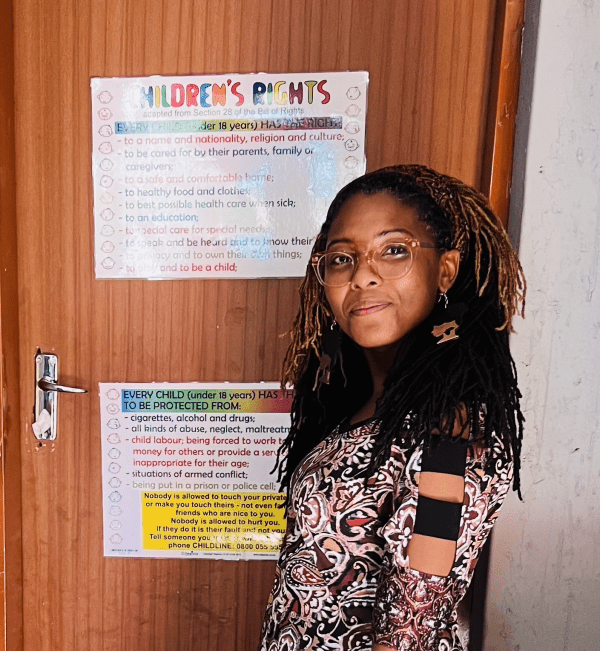
Davis also made deep connections with the people she met in South Africa. The staff at the Marriott where the cohort stayed, “went out of their way to make me feel special,” Davis says. They even surprised her with a gift and handwritten note which included an African name the group has given her. They gave her the name Kharyisa, which derives from the Xhosa language and means “to bring light or illuminate,” Davis explains. This moment made Davis feel truly seen, appreciated and connected to something bigger than herself.
Davis also connected deeply with other Black women in her cohort who also journeyed to South Africa. “We shared a sense of camaraderie and joy,” Davis says. One of her peers “would get so giddy just saying the word ‘Africa,’” Davis says.
One of these women was Jeanne Wardford EdD ’24. Wardford is a program officer for family economic security at the W.K. Kellogg Foundation in Battle Creek, Michigan. “My career and passion have been devoted to creating a better world where our children can thrive—living, working and playing in a nurturing and inspiring environment,” Wardford says.
A seasoned professional whose prior roles include director for national partnerships at NeighborWorks America in Washington, D.C. and community development, fund development and evaluation consulting for TaylarMade Consulting, Wardford was initially attracted to the Global EdD program because of the global educational experience it would provide. In her current role at the Kellogg Foundation, she works to build bridges between communities—locally and internationally, and the Global EdD program seemed the perfect fit to sharpen her perspectives. It also helped that some of her colleagues had been through the program and spoke highly of their experiences.
“I was extremely interested in the fact that we would actually have an opportunity to travel to four continents, to look at education and policy and find out what it is like on the ground,” Wardford says.
Wardford began her trip to South Africa as Jeanne, but she left as Nosipho. On a tour of the Hector Pieterson Museum, the guide, a Zulu warrior, gave both her and her friend their African names. The experience was transformative for Wardford, and she has since begun to use the name in her everyday life.
The cohort’s visits to local educational sites also profoundly impacted Wardford. Like Fu, she was deeply moved by the visit to Dumezweni Elementary School in Soweto. Wardford is well aware that “some of the vestiges of apartheid still exist in the educational system,” yet she was struck by the resiliency of the people. The trip to the elementary school reminded her “how much alike we are in our own core human experiences and aspirations.”
And this was a thread that carried through the entire Global EdD program for Wardford. “Going through this program [you gain a] global perspective. You see how the world is, right?" Wardford says. "No matter our differences, there's something universally familiar about the distinctive fragrance of a middle school boys' gym—a reminder of shared experiences that connect us all."
The value of in-person experiences
In the age of remote work, IRL (in real life) experiences are still an essential part of not only learning but simply a part of being human. We are, after all, social creatures.
Chong stresses the importance of seeing and experiencing in person places like the Global EdD students visited in South Africa. “You need to leave the box in order to think outside of it,” Chong says.
From her time leading the program, she’s witnessed countless organic, experiential learning moments and connected with people from the places the program visits on a deep, human level. Through the intensive on-ground experiences in the international locations, students are able to gain fresh perspectives and see what “equity and education looks like in other societies,” Chong says.
Students in the program are interested in global education, and, as Chong explains, a fair number of them have not traveled outside of the U.S. The program provides them with a structured way to travel, and “seeing how students process the experience,” has been a major career highlight for Chong. They come out of the program “completely different people,” she says, and “that’s what international education is all about.”

